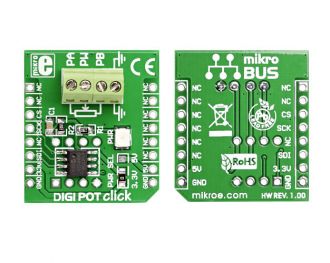
We strongly encourage users to use Package manager for sharing their code on Libstock website, because it boosts your efficiency and leaves the end user with no room for error. [more info]

Rating:
Author: MIKROE
Last Updated: 2019-04-25
Package Version: 1.0.0.1
mikroSDK Library: 1.0.0.0
Category: Digital potentiometer
Downloaded: 13237 times
Followed by: 1 user
License: MIT license
This program demonstrates the usage of single channel Digital Potentiometer (MCP4161) with 8 bit resolution.
Voltage derived from PW pin is read by MCU's ADC. Scaled value is then displayed at PORTD LEDs.
User can increase or decrease resitance by pressing buttons RB2 and RB3.<br/>
Do you want to subscribe in order to receive notifications regarding "DIGI POT click" changes.
Do you want to unsubscribe in order to stop receiving notifications regarding "DIGI POT click" changes.
Do you want to report abuse regarding "DIGI POT click".

Front and back view of DigiPot click board designed in mikroBUS form factor. mikroBUS is specially designed pinout standard with SPI, I2C, Analog, UART, Interrupt, PWM, Reset and Power supply pins.
View full imageLibrary Description
The library covers all the necessary functions to control the DIGI POT Click board. Library performs the communication with the device via SPI driver by writing to registers and reading from the register. The library set 8-bit ( 256 ) wiper positions value, reading the status register and convert to voltage 0V - 3.3V or 0V - 5.0V.
Key functions:
Examples description
The application is composed of three sections:
void applicationTask()
{
for ( cnt = 127; cnt < 255; cnt += 10 )
{
digipot_setWiperPositions( cnt );
Delay_ms( 5000 );
}
}
Other mikroE Libraries used in the example:
SPIUART​Additional notes and informations
Depending on the development board you are using, you may need USB UART click, USB UART 2 click or RS232 click to connect to your PC, for development systems with no UART to USB interface available on the board. The terminal available in all MikroElektronika compilers, or any other terminal application of your choice, can be used to read the message